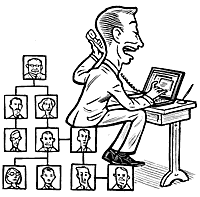Build Your Organizational Equity
There’s more to wealth creation than financial value. Think what rainmaking, reputation, and relationships can do for you and your company.
 |
|
Illustration by Lars Leetaru |
A few months after the project began, Frederick took a week’s vacation. While he was gone, his boss stepped in and tinkered with the process, changing the schedule and undoing a deal the team had made with a supplier. When Frederick returned, he felt his legitimacy had been eroded. What was the point of team management if a higher authority could override it at any moment? Discouraged, Frederick quit his management role and became an engineer again. Within a year, he dropped out of the company entirely, leaving his profession to become a sculptor.
“I wasn’t treated like a person,” he said. “They treated me like a commodity.”
People like Frederick are everywhere, of course, in large organizations — in both good times and bad. They always seem to follow the same type of story. Smart and committed, they know a better way to operate. And then, smash! They come up against the organization’s internal defense system. They go from being the organization’s best hope for making positive changes to being seen as a kind of alien invader. And they never seem to recover from the experience.
But when we look more closely at this story, we see it’s not really about change or resistance. It’s about the hidden factors behind job satisfaction: the reason some people thrive in an organization and others seethe with resentment and ultimately leave. The critical factor (as most managers know) is not the money or other tangible matters, but whether people feel they are treated as a person with a unique contribution to offer and not as an easily replaced commodity.
Think about your own aspirations in that context: What do you want out of your job, your organization, and your career? Maybe you have plans to leave your company. Or maybe you have no plan at all, and you’re coasting along, waiting to see what happens. Whatever your circumstances, you’ve probably come to realize the limits of the organization’s concern for you. Where, then, does that leave you? And what choices can you make if you are dissatisfied? Frederick solved his problem by quitting his job and profession. I’m convinced there’s another solution. It all depends on the kind of equity you build up — that is, the value you create not just for your company but also for yourself.
Core Group Envy
It’s not the bosses at the top of the hierarchy, per se, who penalize people like Frederick. After all, the “tinkering” boss who drove Frederick out was a well-intentioned middle manager, who sincerely regretted that Frederick left (and didn’t really understand his own role in Frederick’s decision to quit the company).
The real force that kept Frederick “invisible” as a person was the organizational culture. Organizations tend to classify their members into two groups of people. First is the Core Group — those executives (and others) who come first because they are seen as central to the enterprise. Their needs and priorities, even if unarticulated, define the mission of the enterprise. They usually include the people at the top of the hierarchy, but they can also include gatekeepers (for instance, the head of a critical production plant or union), or people whose personality or integrity has catapulted them to a position of influence throughout the organization. The organization acts first and foremost to meet the needs of the Core Group. (See “Core Group Therapy,” by Art Kleiner, s+b, Second Quarter 2002.)
The second group, generally 95 percent or more of the organization, consists of “transactional” employees — people who are contracting, in good faith, to provide a service for the organization. They feel they’re being treated as commodities because they are, in effect, commodities. They may not be replaceable, but the organization feels that they are. This sounds like a harsh assessment of organizations, but it’s not as bad as it sounds; you can have a tremendous, highly fulfilling career as a transactional employee, as long as you don’t get confused about your status. (There’s nothing as debilitating as “Core Group envy.”)
The Core Group in most organizations defines the status quo. Even when the Core Group members tell people to be innovative and proactive, the rest of the organization will hear a different intent: Keep things steady and comfortable. The big challenge for non–Core Group members like Frederick is not to protest against the Core Group’s existence, but to become more constructively conscious of its influence and its values. Had Frederick been more conscious of the Core Group when his new team approach was approved, he would have realized that he didn’t have the support he needed to make it work. All around him, people were assuming that, when push came to shove, the Core Group would reject it. Believing that, his supervisor naturally felt compelled to alter Frederick’s plans, if only to save Frederick from an even ruder awakening in the future.
Unfortunately, when the supervisor intervened, however innocent or deliberate his intentions, he ended up not just stirring Frederick to leave the company, but also crippling the project. It ultimately came in extremely late, way over budget, and enmeshed in a lawsuit with a supplier, to boot. Had Frederick stayed on the scene, he might have prevented all that.
Many Equities
Imagine that you are someone in Frederick’s position, someone who sees a new way of operating or a new strategy and yearns to make it work in your company. You recognize that the organization, simply by its nature, cares more about the perceived priorities of the Core Group than it does about committed, creative people like you. At first glance, the circumstances might seem to call for cynicism; in the working world, you might think, idealists “like me” will always come to nothing.
How, then, can you gain any leverage at all? There is a way, which can be highly liberating. It allows people at every level of an organization to act with integrity and intelligence to pursue what they most want and what they believe is best for the organization. You must build your organizational equity — a kind of equity that you can create yourself, that increases your influence in your organization, and that helps you fulfill your own dreams.
You may ordinarily think of equity as the assets, transformed into stock, that shareholders own. This is, of course, a valuable form of equity for employees — whether purchased through options, awarded in grants, or bought through 401(k)-style investments. Paradoxically, this asset’s greatest value comes before it’s cashed in: as a visible sign of your commitment to the performance of the whole. It aligns your fate and the company’s fate in a tangible way. But if it’s the only form of equity you own, as many employee–shareholders have seen in the past two years, it makes you all too vulnerable.
In the end, the conventional definition of equity is far too narrow. It’s better defined as any share of accumulated wealth, including such intangible forms of “social capital” as relationships and reputation. There are dozens of types of equity that an individual can accumulate, including these:
• Fungible Financial Equity. Can you accumulate, through savings or other means, enough money to be able to walk away from an organization if you can’t live with the Core Group? Can you accumulate enough money to invest in your own development, even if your employer doesn’t? Having this amount actually makes it easier to live with the organization, which will sense that you are staying with it through genuine interest, not financial dependence.
• Rainmaking Equity. The ability to raise money or drum up business is another form of capital. It depends, in part, on your contacts in the outside world, and even more on your ability to approach them. If you are not in the Core Group, you can still command enormous respect for this skill.
• Credential Equity. Once you have held a position or acquired a credential, it remains with you for a lifetime. Those who have been presidents of companies can become presidents of companies again. Those with degrees in a field, from engineering to education, are qualified for life for employment in those fields.
• Reputation Equity. People who live by their wits, like lawyers, consultants, and writers, have always known the value of this equity. “If Marconi says something about ultra-short waves,” Ezra Pound wrote, “it means something.” You build your reputation less through the accomplishments you stack up (what you do) than through the way you operate in life (who you are). Sooner or later, you can attract opportunities — such as speaking, teaching, appearing on television, or writing — that further enhance your reputation. At that point, your reputation has become a form of self-generating equity. I know several innovative managers who have protected their right to innovate by continually writing for outside publications and speaking at outside conferences, thereby demonstrating that someone, at least, honors their ideas.
• Relationship Equity. Some people never have a problem widening their personal network or making trusted friends. People seek them out. And relationships breed more relationships. As Malcolm Gladwell noted in The Tipping Point: How Little Things Can Make a Big Difference (Little Brown & Company, 2000), Paul Revere was able to roust the farmers of Middlesex because he was a natural convivialist, a frequenter of bars and a member of social groups, including the budding groups of revolutionaries then emerging. In corporate America, such relationship equity (particularly the ability to know the Core Group) can save people from losing their jobs even when they challenge the top.
• Capability Equity. Perhaps the equity that does the most for you is your ability to gain new capabilities and skills, because these accelerate your accumulation of all the other forms of equity. Most organizational learning literature and emotional intelligence literature (all types of how-to literature) is about building capabilities.
Some forms of organizational equity are measurable, and others are not; but whatever form it takes, it has two key features. First, it gives you leverage in an organization. Second, it accrues exponentially; emotional dynamics grow in the same way that a savings account increases through compounded interest.
When you first consider building a nest egg (say, in your 20s), it seems impossible that your small contributions will ever add up to anything significant. But suppose you stick with it. You even pick up the pace of savings as your income increases, eventually crossing a threshold of confidence: the recognition of your own ability to acquire a significant stake. In other words, you’ve demonstrated your ability to save. Sometime in your 40s or 50s, your account crosses another threshold — the threshold of sustainability. It is large enough to generate a significant income just from the interest. You have created what economists call capital: A resource that replenishes itself.
All equity involves the same two thresholds: confidence and sustainability. Most coming-of-age stories have to do with crossing the threshold of confidence: Harry Potter learns to play quidditch (skill equity); E.B. White’s Wilbur the pig establishes a form of fame that saves his life (reputation equity) through his ability to befriend others (relationship equity); the J.D. Salinger heroine Franny Glass, in his classic book Franny and Zooey, develops a kind of emotional and spiritual depth (capability equity). The message of these stories to the reader is, “You can do it, too.”
Equity must be protected, however. Stories about sustainability are often tales of long-lived dynasties like the Rothschilds, the Kennedys, or the Rockefellers — who continually build on their holdings. But there are many cautionary tales about ne’er-do-wells or hapless types who lose their sustainable position. Just as a family fortune can be completely dissipated, “shirtsleeves to shirtsleeves in three generations,” nonfinancial equity will erode if it is not well managed. Once it is drawn down past the threshold of sustainability, it can vanish with unexpected speed.
Rhythms of Growth
Organizations should help employees accumulate a variety of equity types, not just financial equity. By doing this, organizations could cement loyalty, align people with the purpose of the enterprise, and build a stronger company. In the absence of that organizational support, we can still build equity for ourselves and lead a rich, rewarding life in the workplace, whether or not we are part of the Core Group.
The reason Frederick, the young electronics engineer, got into so much trouble was this: He didn’t have enough different kinds of equity to match the complexity of his job. It’s not just that he didn’t have stock options; those would (at his level) merely have been a symbol of future potential. They would have helped, but they wouldn’t have been sufficient.
At first glance, rainmaking equity was unnecessary for him; the budget was set and funding allocated from above. In reality, however, the ability to raise more money would have greatly increased Frederick’s options (and the team’s). Reputation equity would have helped even more. Any new team leader supervising a major development project needs a reputation for high competence and deep creativity. Frederick lacked this. At minimum, a presentation of the rationale for his approach would have made a difference. Even if people at the top didn’t attend, the presentation would have made them aware of Frederick’s contribution and foresight.
Relationship equity was one of the most important components missing from Frederick’s portfolio. He needed strategic power to maneuver through the infighting among his various bosses, to get sponsorship for his new approach, and to provide “air cover” for his team. Frederick had excellent relationships on a peer level and with suppliers. But his lack of good relationships with those up in the hierarchy was a crippling factor. There was no one he could go to for candid counsel or perspective.
In retrospect, Frederick’s project looks like one that should have been tackled only by someone with a fair amount of organizational equity. People like him often are invited to take on roles and projects that look like a one-way ticket to the top. They are told, in essence, “You are free to fail,” and, because others assume they will fail, the risks seem manageable. But without an organizational equity portfolio, barely visible roadblocks are raised; people come in and micromanage; rumors of incompetence spread. The only way to deal with this is to have accumulated enough organizational equity, of various sorts, that you can protect yourself.
Although all equity growth is compounded, different forms of equity have different rhythms for growth. Money accumulates gradually, with a smooth exponential curve of steady mathematical advancement. Skills and capabilities accumulate through a kind of punctuated equilibrium; the innovative organizational psychologist Elliot Jaques, who died in March, demonstrated that the human ability to deal with complexity crosses a cognitive threshold every 15 years. (See “Elliot Jaques Levels with You,” by Art Kleiner, s+b, First Quarter 2001.) Have you ever suddenly realized that you’re routinely doing complex tasks that flummoxed you a few years ago? That’s what it feels like to cross a cognitive threshold. Reputation’s curve seems to advance with accelerated momentum and then come to sudden stops, with no clear cue about when it will start up again. Only those who seize the moment when opportunity strikes develop rainmaking equity.
Anyone, no matter how downtrodden (or how excluded from the Core Group), can build equity. But there is no one-size-fits-all strategy for building a portfolio of organizational equity. Your choice depends on what is easy for you, and on what equity your organization and its Core Group value. Most important, your choice depends on the kind of life you are trying to create. Because you cannot tell in advance which will be most useful to you, the accrual of many forms of equity will help contribute to a well-rounded life. A reputation for being trustworthy and capable and an extensive network of competent, trustworthy friends who take your calls is a better hedge than a lot of money invested in an unbalanced portfolio of stocks. A lifelong strategy of building equity also means that you don’t have to wait for someone else to bestow something on you — whether it’s stock options, jobs, or membership in the Core Group.
So when taking on a new assignment or pushing your job to a new level, you should ask yourself: What kinds of equity does this challenge require? How much of that equity will I need ahead of time, and how much can I build on the job? And if I don’t have it, what do I do to develop it, and how long will that take?
One final bit of encouragement: Building any of these forms of equity is easier than it seems. It always starts off as a slow and agonizing process, until you cross the threshold of confidence. And by the time you cross the threshold of sustainability (if you ever get there), it’s hard to remember that you ever had a problem. ![]()
This article is adapted from Who Really Matters: The Core Group Theory of Power, Privilege, and Business Success, by Art Kleiner. © 2003 by Art Kleiner. To be published by Doubleday Currency in August 2003.
Reprint No. 03203
| Authors
Art Kleiner, art@well.com is the “Culture & Change” columnist and a regular contributor of “The Creative Mind” profiles for strategy+business. He teaches at New York University’s Interactive Telecommunications Program. His Web site is www.well.com/user/art. Mr. Kleiner is the author of The Age of Heretics (Doubleday, 1996); his next book, Who Really Matters: The Core Group Theory of Power, Privilege, and Business Success, will be published by Doubleday Currency in August 2003.
|



